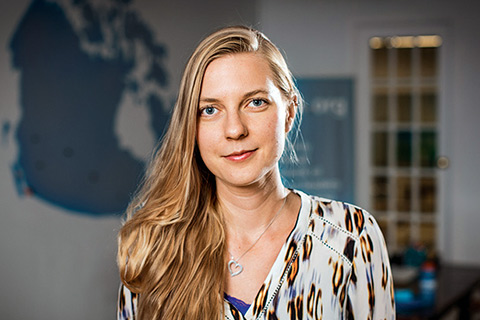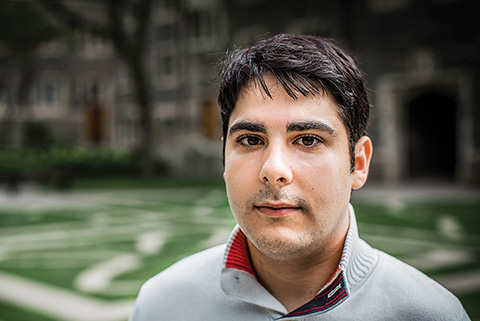Erin Hodgson (BSc 2012 St. Michael’s) was a curious and creative kid who felt most at home in the natural world, with its hiking trails and abundance of wildlife. Although shy and given to daydreaming, she cherished the few close friends she had.
But one day, when she was 10 years old, the sunny skies of her childhood began to darken. “I was sitting on the edge of a soccer field, waiting for my turn to play,” she recalls. “Out of nowhere, I was flooded with fear.”
Within a short time she was compulsively washing her hands and performing self-protective rituals; a diagnosis of obsessive-compulsive disorder soon followed. “But the bigger part of my story isn’t the illness,” she says. “It’s the way people started to treat me because of it.” Social anxiety ran like a black scar through her adolescence, leading to isolation from her peers.
A gifted writer, Hodgson had initially hoped to pursue professional writing at university, but decided to take psychology upon arriving at U of T a decade ago. “I craved knowledge about the mind and brain,” she says. “Probably because I was so desperate to understand what I had been dealing with, and how I might help others in a similar situation.”
But life at university proved difficult. Struggling with academic pressure and unable to forge the social connections she craved, Hodgson fell into a deep depression. After several tormented months, she attempted suicide.
Hodgson finally did earn her degree in psychology – after seven years of part-time study, repeated stays in hospital and treatments that included electroconvulsive therapy. Gradually, the good days began to outnumber the bad, and she started looking forward to the future.
Poised and articulate at 29, she now enjoys a successful career as a public speaker and mental health advocate; being able to realize her dream of helping others has been an important factor in her recovery.
Recently, Hodgson reconnected with her U of T roommates, who’d noticed her withdrawing, not going to class and failing to get out of bed. They told her that they’d felt helpless to do anything. “For me,” she says, “that opened up the idea that everyone needs to get more informed, because I’m not the only one who’s been through this.”

Like many other universities, U of T is dealing with increased demand for mental health services among its student population. In the past five years, the university has seen the number of students registering at Accessibility Services with mental health as their main disability almost triple. Data from the 2013 National College Health Assessment survey, which polled 30,000 students across the country, is sobering: almost 20 per cent said they’d experienced depression in the previous year; almost 30 per cent reported anxiety and almost 40 per cent said they were stressed. Tragically, a number of North American schools have seen students take their own lives in recent years.
Growing up has never been easy: young people aged 15 to 24 are more likely to experience mental illness or substance abuse than any other age group. But students today grapple with a battery of stressors, some of which are new. They may feel isolated after moving away from home for the first time (some to a new country) or overwhelmed by having to compete with highly successful peers. Some may struggle to connect with new friends and others may be worried about an uncertain job market upon graduation.
This is why mental health is becoming such an important issue on campus today – an issue that, in its universal appeal, has galvanized all members of the University of Toronto community. Although U of T has long offered a range of mental health supports, administrators have now issued an extensive new series of recommendations to expand services and to ensure that conditions university-wide enable students to flourish. Students are coming up with creative, grassroots solutions on what seems like a weekly basis. And the school’s chancellor, Michael Wilson, is one of the greatest champions for mental health this country has ever produced: a politician and banker who, in the wake of his own son’s death by suicide, has made it his life’s mission to prevent other such tragedies from happening.
Lucy Fromowitz, U of T’s assistant vice-president of student life, says that students who come to university with existing mental health problems likely would have been unable to attend university a generation ago due to a lack of support in secondary school; resources just weren’t available. “And years ago,” she says, “students who had a first episode of mental illness while in university may not have completed their studies. Now that’s changed. The appropriate expectation is that we’ll support them to achieve their goals.”
In October of last year, the university crafted a new mental health strategy, in the form of a landmark report (see “A New Strategy for Student Mental Health”). English professor Jill Matus, in her former capacity as vice-provost, students, chaired the provostial committee that oversaw the report’s production. “We are all part of the solution, and the support network. The whole institution has a role to play here,” she says. “This report is really a call to the university community to understand and embrace the support of mental health needs.”
The committee began by reviewing a list of existing resources, and then looked at best practices in mental health and sought opportunities to enhance and expand services. The result is a cohesive framework that emphasizes the importance of an inclusive curriculum, as well as training for faculty and staff so that they will know what to do when approached by a student who clearly needs help. But what stands out most, perhaps, is its emphasis on maintaining a student’s well-being before illness can set in. Matus and Fromowitz say that means dealing with “the whole student” – attending to physical, emotional and intellectual needs. In their view, sleep, nutrition, exercise, social engagement and academic support are all considered just as essential to building resilience – the ability to navigate through stress and adversity – as psychological counselling.
The difficulty, however, is getting that message out. Students experiencing mental health concerns often think they need a doctor or psychiatrist, says Fromowitz, but many who are dealing with anxiety might actually be better served by another type of professional. Students feeling stressed about career decisions, for example, would be directed to the Career Centre, where they could meet with career staff, engage in job shadowing or talk with professionals in fields they might be interested in. Or, “if feeling overwhelmed by their workload, they might meet with a learning strategist to reflect on their study habits and focus on goals – and perhaps in a group environment with students who are working through the same thing.”
Fromowitz and her team are advocates of group therapy for several reasons. It fosters new connections, enables students to assist one another and helps students develop strategies to cope with future stressful situations. And most importantly: “When you understand that others feel the same way, it brings a sense of relief,” says Fromowitz.
U of T’s Doctor Mike Evans on how to manage stress:
The strategies for reaching students are also changing. Making services accessible also means locating them where students spend most of their time. With this in mind, the university is increasingly embedding counsellors in locations across the three campuses (such as within colleges and departments), so that students can access services when needed without necessarily going to the Health and Wellness Centre.
“A great part of my job is the location,” says Heather Burns-Shillington, a cheerful social worker who provides in-house counselling directly within U of T Mississauga residences. “My office is right across from the dining hall: it’s very accessible. I’m part of the community, and meeting with me is just like meeting with anyone else.” Embedded counsellors become quickly familiar with concerns unique to the group they serve, which creates a kind of therapeutic shorthand.
It’s clear, though, that the services of a psychiatrist are sometimes required. “We can ensure that a student in extreme distress sees a psychiatrist that day,” notes Fromowitz. “Outside the university, if you want access to a psychiatrist, you may have to wait upwards of a year to get an appointment.”
The School of Graduate Studies has become highly active in addressing the needs unique to its own cohort as well. “The context of life is different for graduate students – particularly those in the doctoral stream, whose academic work is often very intense,” says Locke Rowe, the school’s dean. “In some disciplines, students are interacting with their lab group day after day; in others they’re alone somewhere, writing by themselves.” Both situations can prove equally stressful.
Last spring, the school partnered with the Health and Wellness Centre to provide an embedded counsellor specifically for graduate students. As Sandy Welsh, the current vice-provost, students, points out, a number of grad students said they felt uncomfortable going to the university’s Counselling and Psychological Services office: “Many work as teaching assistants, and they might encounter the students they’re teaching sitting in the waiting room,” says Welsh. That counsellor’s duties have since been increased from one to three days a week, due to rising demand.
Grad Minds, a student-run mental health program launched two years ago, also recognizes the unique challenges graduate students face within the university. An ad hoc committee of the Graduate Students’ Union, the group provides peer support twice a week and stages events such as conferences and workshops for students. It also holds free weekly yoga sessions.
The level of support throughout the university sounds impressive. But as everyone struggling with mental illness knows, it can be notoriously difficult to treat. There will always be limits to what a university can do for students who require long-term psychiatric followup. “We do offer health services, but we do not see ourselves as health-care providers,” Matus says. “We are an educational institution. That’s why the community partnerships we have, with places like the Centre for Addiction and Mental Health, are very important. We can’t do it all ourselves.”
Fortunately, the university doesn’t have to. It’s true that donors, hospitals and agencies can all lend a hand in the fight against mental illness, and have all done so. But these days, another powerful source of help has emerged from within: students themselves.
Tayyab Rashid knows this as well as anyone. In 2012, he started a program at UTSC called Flourish. Based on the tenets of positive psychology, it encourages participants, many of whom are in first year, to concentrate on their strengths instead of their weaknesses. Shortly after being hired at UTSC to conduct psychotherapy with students, he asked his bosses: “Do you want me to sit with clients and rehash their traumas, their damages, their deficits? I can do that, I’m trained to do that. But do you really think that is going to bring out the best in our students?”
After completing an online assessment, students in Rashid’s program are invited to attend a workshop in which they are encouraged to build resilience through activities and challenges, using strengths they have identified themselves. They can then be connected to professionals – such as career counsellor Ruth Louden and fitness program coordinator Laurie Wright – who help them achieve their goals.
When Flourish started, Rashid was full of optimism. But the program had a slow start. “For the first few years, we did anything and everything to get students. Sometimes, Ruth and I would be sitting in a big room staring at each other because they weren’t coming,” he sighs.
And then it dawned on him: asking students to come in for help was, in itself, a silent appeal to their weaknesses. Asking them to come in and offer help? That would be something altogether different. So last fall, Rashid, Louden and Wright started inviting third- and fourth-year “student ambassadors” to meet regularly, contribute ideas and act as mentors to first-year students – resulting in a “dramatic shift” for Flourish. Within very little time, a sizable number of students were using Flourish and, at the same time, helping to shape its direction.
So it is that on a hot day in July – when many of them might prefer to be anywhere but a classroom – about 15 upper-year students are meeting to discuss fall orientation plans. For some of them, Flourish is only one of several mental health initiatives on their plate. Karen Young, for example, has just launched Minds Matter Magazine. “I went through my own struggles after first year,” she tells me, “and then I learned that mental illness costs the Canadian economy $50 billion a year.” Her passion ignited, she enrolled in UTSC’s unique psychology co-op program, which involves practical work experience.
Remarkably, all the Flourish students are frank and forthright about their own battles with less-than-perfect mental health. They aren’t stigmatized in the least. “I used to catastrophize everything,” says Candice Richardson ruefully. “One bad mark, and I’d think it was the end of the world. Now, though, I try to look at the problem rationally.”
The sheer number of student mental health initiatives ranging across all three campuses should leave no one in doubt that this is a hugely important concern. Students are connecting with each other by setting up craft tables, hosting seminars and staging impromptu dance parties. There’s the Healthy U Crew, Peers are Here, Grad Minds, the Mental Health Action Team, Stress Busters, Mindful Mondays, Therapeutic Tuesdays … the list goes on.

Fromowitz says that one of her department’s projects was to collect information on the many groups and create a list that could be viewed at a glance, thereby addressing a concern that the large number of mental health initiatives was potentially confusing to students. Trinity student Kaleem Hawa, who has himself been a key member of no less than four mental health improvement programs, and sat on the committee that drafted the new mental health strategy, sees the range of options as entirely positive: “It would be more worrying if there was no diversity, and nobody cared.” More groups, he says, leads to a greater likelihood that a student can find one specially tailored to his or her needs.
Often, students are teaming up with the university administration. Last year, for instance, Trinity College provost Mayo Moran informed Hawa and his fellow student leaders at Trinity of her intent to raise funds for an embedded counsellor at the college. Trinity students voted in favour of a levy to provide $9,000 a year to support the eventual instalment of a counsellor, representing, says Hawa, “one of the largest student-driven financial commitments to mental health at U of T.”
UTM’s Burns-Shillington was awed to see how many students devoted an entire weekend last year to participate in ASIST (Applied Suicide Intervention Skills Training) workshops she ran at both Mississauga and St. George campuses. “It’s pretty fantastic to see young people so devoted to this,” she says.
With all this student innovation, it’s odd that some commentators cite a lack of old-fashioned resilience, brought on by so-called helicopter parenting, as an explanation for why some modern students struggle. “Oh, I know that school of thought,” scoffs Hawa. “They say, ‘In our day we just rolled up our sleeves and managed. We got over it, other people should too.’ But when individuals are clinically depressed, that often has nothing to do with how they were raised. In the old days, the broader community appeared more resilient because those people weren’t allowed to feel comfortable speaking up. Now they are.”
These days, Erin Hodgson tells her own life story often – and coaches other young people to do the same – as the speakers’ program lead for Jack.org, a nationwide advocacy group and registered charity founded by automotive and software executive Eric Windeler in the wake of his son Jack’s death by suicide in 2010. (The group has a chapter at U of T, where students run campus-wide initiatives to start conversations about mental health.)
In the past six years, Hodgson has spoken to tens of thousands of young people; whenever she shares her story with them, she gets dozens of stories back. “Why have we been silent for so long about this huge part of the human experience, one that all of us share?” she asks. “All of us have bad times, and go through stress and loss. Everybody struggles. It shouldn’t be taboo to talk about that.”
Recent Posts
U of T’s 197th Birthday Quiz
Test your knowledge of all things U of T in honour of the university’s 197th anniversary on March 15!
Are Cold Plunges Good for You?
Research suggests they are, in three ways
Work Has Changed. So Have the Qualities of Good Leadership
Rapid shifts in everything from technology to employee expectations are pressuring leaders to constantly adapt







2 Responses to “ Healthy Minds ”
So encouraging to know that things are looking up for students with mental health issues. With a masters degree in psychology and a daughter at the university struggling with mental disorders, I have been quite touched with the efforts U of T is making. All the best, I and would like to be a part of this endeavour in any way possible.
"Healthy Minds, "A New Strategy for Student Mental Health" and "A Canadian hero for Mental Health" are excellent, thought-provoking and informative contributions that I have read over a few times and will bring to the attention of others. There is a great need for public education and informed awareness regarding mental health. Thank you.